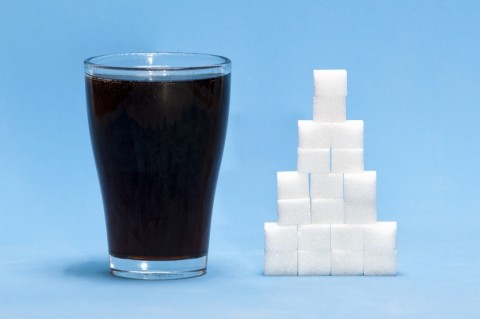DrCarney.com Blog
Sugary Beverages Add to Type 2 Diabetes Risk
Sugar-sweetened beverages are the largest single source of added sugar in the diet of most Americans. They supply about 36% of added sugar in the American diet, and consume a large portion of the grocery budget of many families. In 2013, US households spent an estimated $14.3 billion on sugar-sweetened beverages. This figure is a big boost to the financial health of the manufacturers of sugary beverages, but it has the opposite effect on the health of the consumers of of these companies products. Regular consumption of sugary drinks, such as soft drinks, fruit drinks, energy drinks, and vitamin water drinks is associated with weight gain, tooth decay, gout, heart disease, kidney disease, and type 2 diabetes.
Type 2 diabetes is a life-threatening metabolic disorder characterized by high level of blood sugar and increased insulin resistance that affects millions of people worldwide. According to the World Health Organization (WHO), more than 310 million people are suffering from type 2 diabetes globally and about 1 in every 10 individuals in the United States above the age of 20 has the disease. The findings of many studies have shown that high intake of sugary beverages may contribute positively to the development of type 2 diabetes.
The Diabetes Promoting Action of Sugar-sweetened Beverages
Research has shown that the human body processes the sugar in beverages in a much different way from the sugar found in food—especially fiber-rich foods, such as whole grains, vegetables, and apples. An apple contains 20 grams of sugar in addition to lots of fiber and other nutrients. Fiber slows the rate of digestion of sugar in the human gastrointestinal tract, so it takes a significant amount of time to release the sugar stored in the apple to our bloodstream. The gradual release of the sugar in apple makes it easy for our body cells to effectively utilize this sugar.
On the other hand, sugar-sweetened beverages do not contain fiber. A can of sugar-sweetened soda or fruit punch contains about 150 calories of sugar, all of which are frequently from high fructose corn syrup. The quantity of sugar in a can of sugary beverage is equivalent to 10 teaspoons of table sugar. When we drink a can of sugar-sweetened beverage, these 150 calories of sugar are delivered rapidly to our bloodstream, causing a sharp rise in the plasma concentrations of glucose. Many researchers are of the opinion that high blood glucose level may increase type 2 diabetes risk by directly promoting insulin resistance or the excess glucose is converted to fats which induce insulin resistance and impair glucose uptake by the body cells. We also know from many studies that excess fats in the diet increase insulin resistance. Adding excessive amounts of sugar to a thus compromised system exacerbates the problem.
Why Sugar-sweetened Beverages are Unhealthy
Sugary beverages have virtually no nutritional value, so they are not healthy beverages. Sugar-sweetened beverages come with a sensation of sweet taste in one hand and a bag of chronic diseases in the other hand. Habitual intake of sugary beverages may increase the odds of developing type 2 diabetes by 26%, according to a 2016 study. You can significantly cut down your type 2 diabetes risk by completely avoiding these tasty, seemingly refreshing, but equally unhealthy sugary beverages.
Additional Information:
(1) Consumption of Sugar-sweetened Beverages
(2) USDA Dietary Guidelines for Americans 2010
(3) Type 2 Diabetes Statistics and Facts
(5) Harvard School of Health - Sugary Drinks
(6) Sweeteners and Risk of Obesity and Type 2 Diabetes: The Role of Sugar-Sweetened Beverages
(7) Sugar-Sweetened Beverages and Risk of Metabolic Syndrome and Type 2 Diabetes
(8) Even If You Are Lean, 1 Soda Per Day Ups Your Type 2 Diabetes Risk
(9) How Soda Impacts Diabetes Risk
Scroll Down Page to Leave Comments

Got Questions?
We would love to receive your questions. Join in the Starch-Smart Discussions on DrCarney.com by signing up for a free membership to the Dr. Carney Community.
Preview the "Best Blood Pressure Plan" Trailer
More Health, Less Medicine: Why take drugs for life to lower blood pressure? Resolve blood pressures naturally, with less medication! Many of Dr. Carney's patients normalize to need no medicine at all, using science from her Starch-Smart® System. Discover which foods raise blood pressure, narrow the arteries, and damage those all-important endothelial cells. Dr. Carney teaches the best ways to dilate your arteries today, and ditch those meds for good.
When you subscribe to the blog, we will send you an e-mail when there are new updates on the site so you wouldn't miss them.




